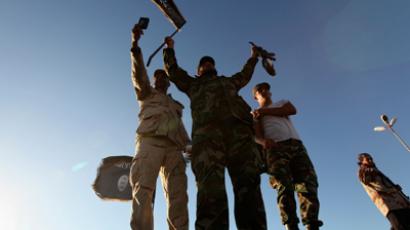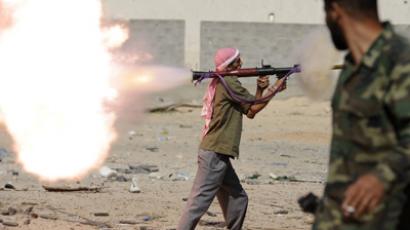'No food, no drugs': Libyan troops siege ex-Gaddafi stronghold
Armed Libyan forces continue to surround the city of Bani Walid, Libya. As tension between government troops and opposition supporters continues to mount, residents have been left without food and other supplies – and are calling on the UN for help.
Human rights group Amnesty International has asked authorities to avoid unnecessary force, and to allow medical and other vital supplies into the city. It comes after Libya’s General National Congress gave the Ministries of Interior and Defense permission to use force to arrest those suspected of killing Omran Shaaban – the man who is credited for capturing the country’s ex-leader, Muammar Gaddafi, last year. Over the past week, government troops have surrounded the city. “Right now, the armed forces are attacking our city at the eastern boundary between us and Misrata city,” Dr. Abdul-hamid Alshandoli, a member of Bani Walid’s social council who is inside the sieged city, told RT.The government also called on the release of others being detained in Bani Walid, giving those in the city ten days to comply. The deadline came and went on Friday. The chief of staff for Libya’s army issued a statement on Thursday, calling on residents to hand over the individuals to avoid a military assault.According to Amnesty International, hundreds of residents in the city have been arrested by armed militias. Many continue to be detained without being charged or put on trial, and have been tortured or otherwise ill-treated, the organization said.
But despite calls from the army, a large number of residents have turned out to protest the demands.“Many armed groups came to main entrance of Bani Walid and they asked the people to get out of the city. We have decided not to go because we want to defend our rights, our homes, and our families,” Alshandoli said.
As the conflict between government forces and opposition followers continues in the former Gaddafi stronghold, the city is reportedly suffering from a lack of necessary supplies.On October 4th, local doctors said that a group of armed men prevented three vehicles carrying medical supplies, personnel, and oxygen from entering the city. The men had set up a checkpoint about 80 kilometers away from Bani Walid, according to Bikya Masr news.“The situation is very bad. No fuel, no food, no drugs, no communication. Everything is in a very bad situation,” Alshandoli said.A petition circulating around the city on Friday night asked the UN Security Council to convene an emergency meeting and “to immediately intervene to protect the civilians in the town.” Signatories of the petition claimed that pro-government armed militias were trying to kill large numbers of people in Bani Walid, because of the city’s pro-Gaddafi history. However, it seems the solution is not as easy as simply asking the UN for help.“It’s difficult to know how to actually provide assistance in this case. It’s a question of what type of international body has the authority to come in, in what way they have the mandate or ability to act, and how they themselves can be protected – given the repeated and numerous strikes against Western targets in Libya over the past year,” editor of the Corbett Report, James Corbett, told RT.Bani Walid was one of the last cities to fall under the control of anti-Gaddafi forces last year.Libya is still plagued with violence between pro-Gaddafi loyalists and supporters of the country’s new government – calling into question whether the fall of Gaddafi was indeed the beginning of a new Libya. According to the UN, many pro-Gaddafi loyalists have been detained in grim conditions, abused and tortured, since last year’s uprising.Reports of mistreatment serve as an embarrassment for Libya’s new government, as well as for western powers – which fiercely supported the rebellion.
Libyan leadership in turmoilMeanwhile the rule in Libya is in the hands of factional lawmakers since the ousting of Mustafa Abushagur, the first prime minister to be elected after the 2011 toppling of Muammar Gaddafi.The no-confidence vote came after his proposal of the new “crisis cabinet” after he withdrew his first ministerial line-up. The second attempt to submit the government composition resulted in his ouster, just a month after he took office.Abushagur represented an offshoot of the country’s oldest anti-Gaddafi opposition movement. The outgoing PM said he respected the decision made by the General National Congress, but warned of possible instability in the already conflict-torn country.“I was going to form a national unity government, not based on quotas,” Abushagur told the lawmakers. “But then there was pressure on me.”














